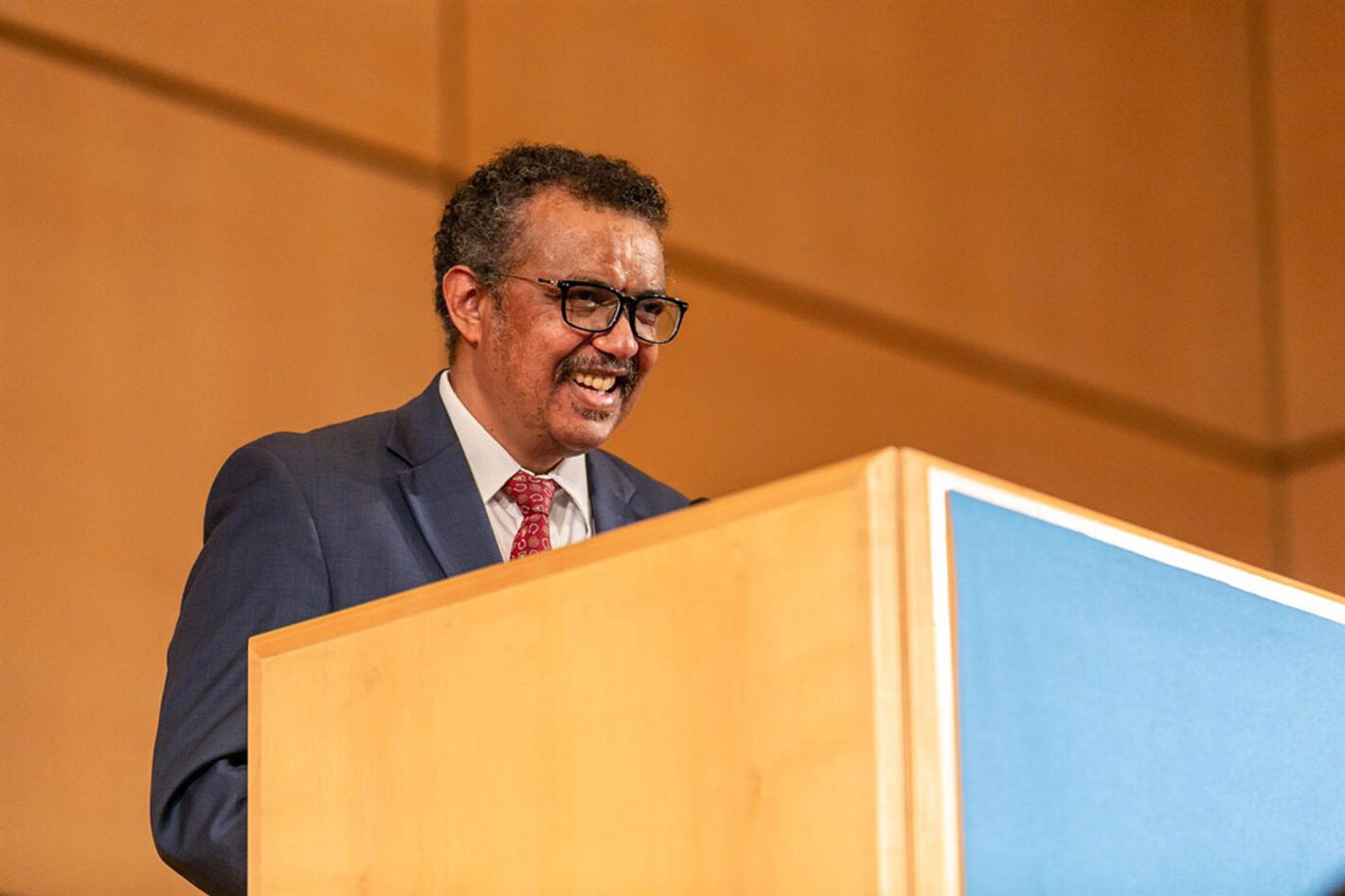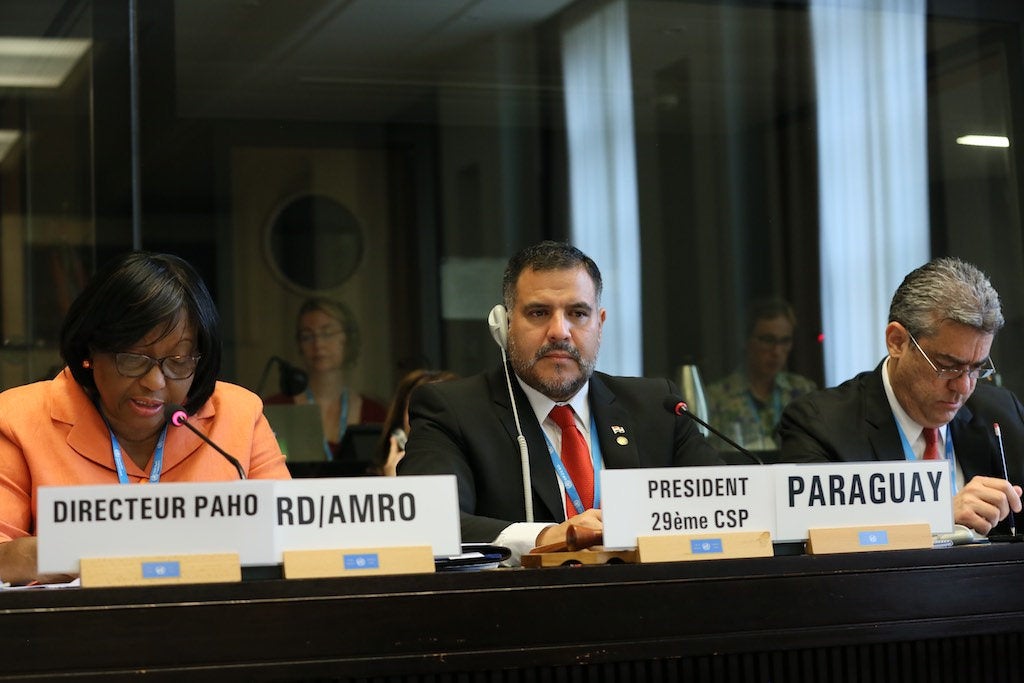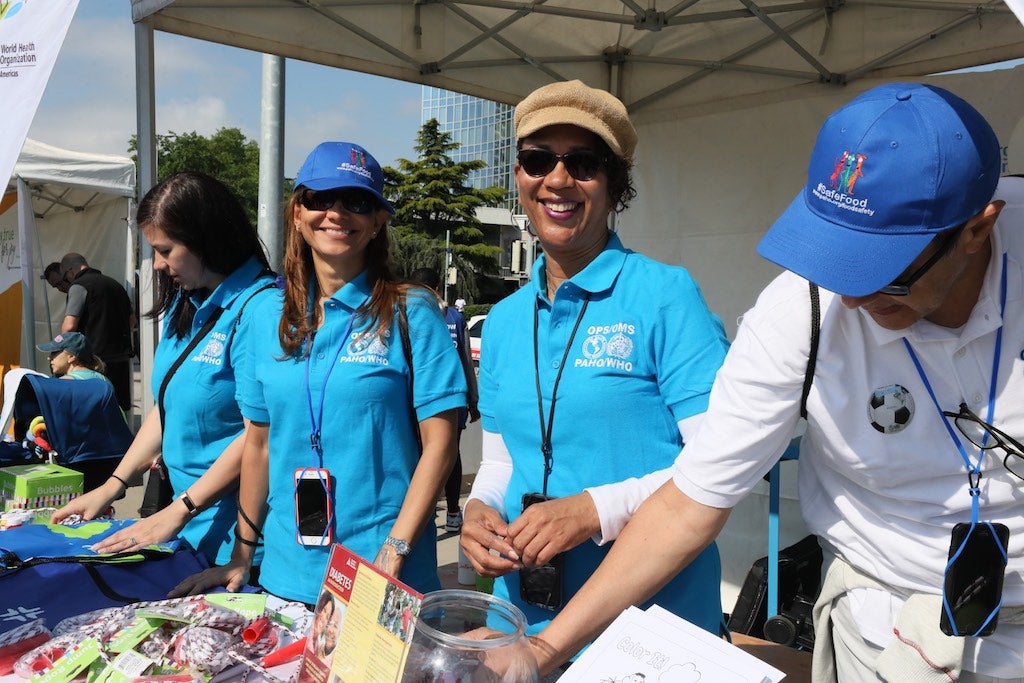
Geneva, 21 May 2018 (PAHO/WHO) - The 71st World Health Assembly opened today in Switzerland, with a full agenda and a commemoration of the 70 years the World Health Organization (WHO) has been in existence.
In his plenary opening speech, the Director-General of WHO, Tedros Adhanom Ghebreyesus, highlighted WHO's new General Programme of Work for the next five years. "[This] is not about reinventing the wheel. It's about making a bigger impact than we already make. It is ambitious, as it should be. The vision set at our founding 70 years ago is not a modest vision. Our Constitution is not a modest document," Tedros said.
"The eradication of smallpox stands as one of the greatest achievements not only in the history of WHO, but in the history of medicine. That's what WHO is capable of. This is an organization that changes the course of history," the Director-General said, listing all the actions taken by the organization in every area, including emergencies, response to chronic diseases, and other issues. He stressed the importance of having an impact where it counts the most: at the country level.
In this context, Dr. Tedros called on the Member States to be proactive in assuring "health for all," the general subject of discussion selected for this year's World Health Assembly.
The president of Rwanda, Paul Kagame, was a special guest at the opening session, where he referred to his country's achievements in the area of universal health coverage. "Achieving Universal Health Coverage is feasible for countries at every income level," he said.
At the same ceremony, Dr. Tedros and the head of state paid homage to Carlos Urbani, a doctor who used to work for the World Health Organization, who discovered SARS and passed away from the disease in 2003 when he was treating patients.
The Region of the Americas calls for prioritizing universal health coverage and access
When presenting the position of the Region of the Americas, the Canadian Minister of Health, Ginnette Petitpas Taylor, said that universal health coverage is one of the highest priorities for the countries of the Region, and recalled that the Americas was the first region to approve a strategy on this subject, setting targets and addressing the challenges in each country. She recognized the progress made in achieving universal health coverage and maintaining the quality of services, and promised that the Americas would work with other regions to share these experiences.
Petitpas Taylor also mentioned that the region adopted a Sustainable Health Agenda for the Americas 2030, based on the Sustainable Development Goals. "This is a call to action that urges us to work together to achieve the highest levels of health and wellbeing for our populations," she explained.
However, she warned, current challenges must be recognized, one of which is preventing a reemergence of diseases that have been eliminated, such as measles. "Now more than ever, it is crucial to protect our populations from preventable diseases, given the frequent movement of people throughout the regions," she said. The minister added that another challenge is addressing the factors that lead to noncommunicable diseases, ensuring access to high-cost medicines, and reducing maternal mortality. Petitpas stressed that all of these elements are key to ensuring access to medicines.
Countries of the Americas hold various positions in the World Health Assembly
The countries of the Americas will hold various positions in the World Health Assembly. The Minister of Health of the Dominican Republic, Rafael Sánchez Cárdenas, assumed one of the five vice presidencies of the World Health Assembly, representing the Region of the Americas.
The Minister of Health of Ecuador, Verónica Espinosa, will occupy the Vice Presidency of Committee A, which discusses technical resolutions that are subsequently considered at the plenary meeting.
Argentina, Barbados, Cuba, and the United States will be representing the Region of the Americas on the World Assembly Board, and Jamaica and El Salvador will be on the Credentials Committee.
The appointments stem from agreements reached by the countries in September 2017 during PAHO's Pan American Sanitary Conference.
More about countries of the Americas at the World Health Assembly
Delegation of the Americas discusses World Assembly issues with PAHO Director
Prior to the start of the World Health Assembly, delegations from the countries of the Americas met with the Director of the Pan American Health Organization, Carissa F. Etienne, to review the agenda items.

Etienne said the most relevant issues were the WHO Programme of Work for the next five years, the debate on universal health coverage, the resolutions to be discussed on health and the environment, and the call to the High-Level Meeting of the United Nations on Noncommunicable Diseases that will meet in September.
The meeting was headed by the Minister of Health of Paraguay, Carlos Morínigo, who also chairs the PAHO Directing Council. He was joined by the Minister of Health of Panama Miguel Mayo di Bello, who chairs the PAHO Executive Committee, and by the representative of Canada, which occupies the Presidency of the group of Countries of the Americas.
More about the delegation of the Americas discussion on issues for the World Health Assembly
Side events
Primary health care, community health workers, and universal health coverage
The importance of community health workers and of strengthening primary health care to achieve universal health coverage were the topics addressed during this side event, which was co-organized by Ecuador and attended by the Director-General of WHO, as well as Michel Sidibé (Executive Director of UNAIDS), Garça Machel, and ministers from all regions.
The Minister of Ecuador, Verónica Espinosa, highlighted what her country has achieved by betting on community health workers, in terms of both their training and work model. She said that people have access to free, quality health services because primary healthcare was strengthened by using community health workers. "A change in the model has put the emphasis on these workers," she explained. "We can't have primary health care or universal health care if we don't design models that include health workers and a community focus," Espinosa said.
Commonwealth Health Ministers pursue collective action to address noncommunicable diseases
At their annual meeting prior to the opening of the 71st World Health Assembly, the health authorities of the Commonwealth exchanged ideas on the possibility of taking collective actions for raising awareness, mobilizing resources, and ensuring access to universal health coverage to defeat noncommunicable diseases.
They also discussed effective financing models for universal health care, including the mobilization of national resources, the effective use of contributions, and mechanisms for pooled procurement of health supplies and medicines. They also considered joint activities to do more to prevent cervical cancer in girls and women and provide a coordinated response to gender-based violence.
More about the Commonwealth Health Ministers
PAHO actively participates in health promotion event
With the slogan "Walk the Talk: the Health for All Challenge," an event organized by the World Health Organization (WHO) to celebrate its 70 years of existence, thousands of people gathered on Sunday, 20 May, in the Place des Nations to participate in walks, races, and other physical activities.

Delegations from the countries of the Americas and the Pan American Health Organization (PAHO) actively participated throughout the event. PAHO had an interactive stand in the main plaza, where hundreds of people could test their jump-rope skills and do pre-race warmups.
More on the health promotion event



